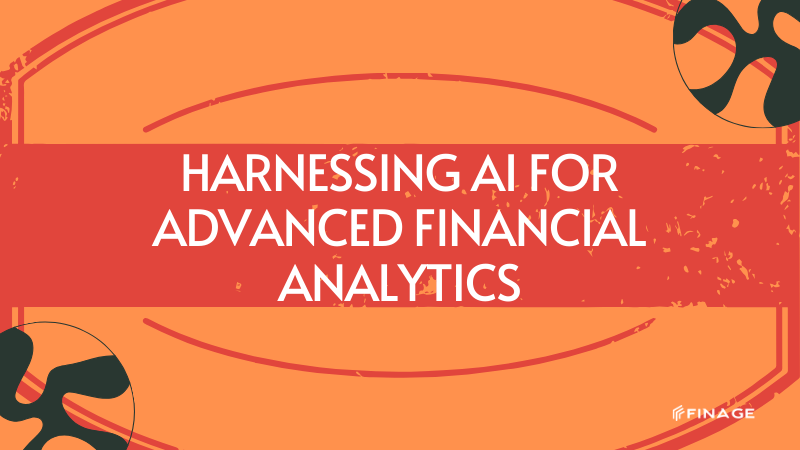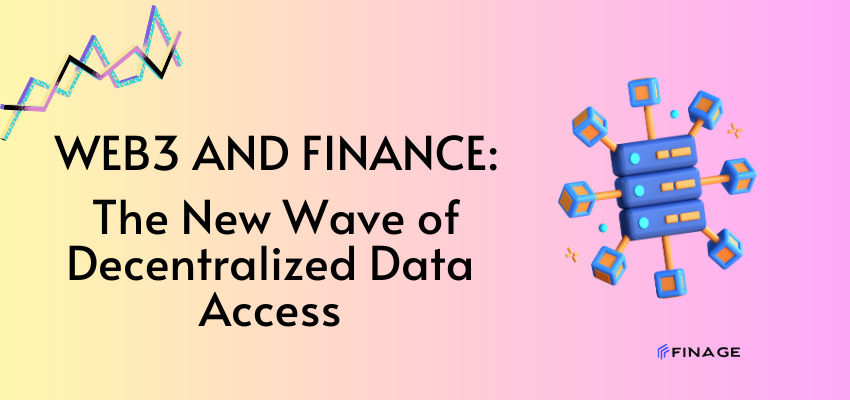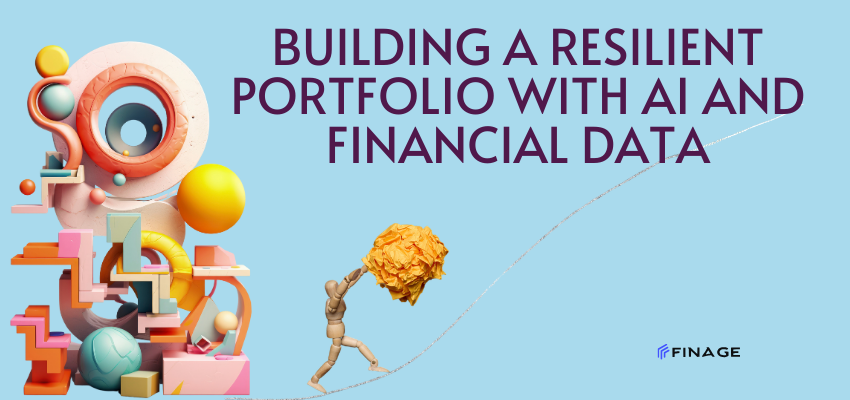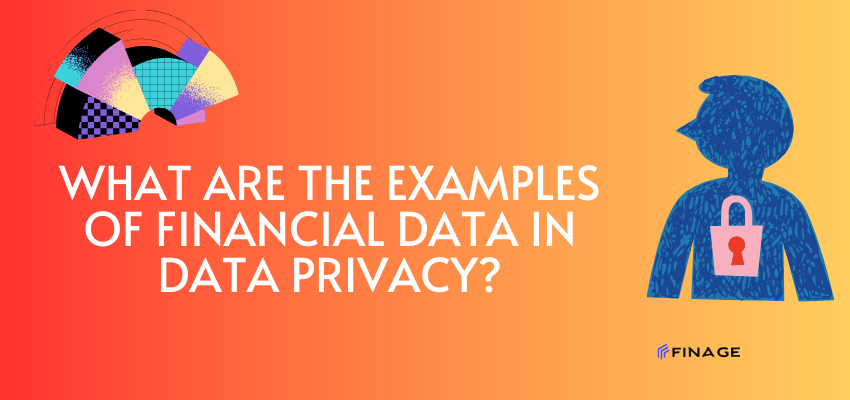Back to Blog
by Finage at July 26, 2023 • 5 MIN READ
Real-Time Data

Harnessing AI for Advanced Financial Analytics
Introduction
Amidst the dynamic shifts within the financial sphere, Artificial Intelligence (AI) stands as a transformative force, particularly in the domain of financial analytics. Its unparalleled capacity to sift through enormous datasets, discern intricate patterns, and forecast potential outcomes has revolutionized the modus operandi of financial institutions. AI's integration in this realm isn't merely a technological upgrade; it signifies a fundamental redefinition of processes governing operations, investment strategies, and decision-making paradigms within the financial sector. In this blog post, our aim is to delve deeply into the nuanced facets of AI in financial analytics, shedding light on its multifaceted applications, inherent advantages, and the ethical dilemmas it inherently poses.
The applications of AI in financial analytics are multifarious, extending across various sectors within finance. From algorithmic trading and risk assessment to fraud detection and customer service, AI algorithms bolster efficiency and precision. By analyzing market trends and historical data swiftly, AI-equipped systems aid in making real-time, data-driven decisions. Furthermore, these technologies enable the development of personalized financial services, enhancing customer experiences while optimizing resource allocation for financial institutions. However, the vast potential of AI in financial analytics brings forth complex ethical considerations, including issues related to privacy, bias in decision-making algorithms, and overall accountability in automated financial systems.
Unquestionably, the benefits of AI in financial analytics are substantial, offering streamlined operations, improved risk management, and enhanced customer service. Nevertheless, ethical quandaries loom large in this landscape. The utilization of AI in financial decision-making raises pertinent questions about transparency, fairness, and the responsible use of customer data. Striking a delicate balance between maximizing the potential of AI and ensuring ethical governance is imperative for the sustainable integration of these technologies within financial analytics, preserving trust and integrity within the financial sector.
Table of Contents
- The AI Revolution in Finance
- Understanding AI in Financial Contexts
- The Journey from Data to Insights
- Applications of AI in Financial Analytics
- Risk Assessment and Management
- Algorithmic Trading
- Personalized Banking Services
- Benefits of AI-Driven Financial Analytics
- Enhanced Accuracy and Efficiency
- Real-time Processing and Decision Making
- Predictive Analytics for Future Planning
- Challenges and Ethical Considerations
- Data Privacy and Security
- Bias and Fairness in AI Systems
- Regulatory Compliance
- Future Trends in AI and Financial Analytics
- Integration with Blockchain
- The Rise of Robo-Advisors
- AI in Financial Regulation and Compliance
- Final Thoughts
The AI Revolution in Finance
Understanding AI in Financial Contexts
AI refers to the simulation of human intelligence in machines that are programmed to think and learn. In finance, AI systems analyze historical and real-time data to provide actionable insights, automate complex processes, and forecast trends.
The Journey from Data to Insights
The transformation of raw data into strategic insights is a complex process that AI simplifies. Through machine learning algorithms and neural networks, AI systems can process and analyze data at a speed and depth unattainable by human analysts.
Applications of AI in Financial Analytics
Risk Assessment and Management
AI algorithms can predict credit risks, identify fraudulent activities, and optimize portfolios by analyzing market data and consumer behavior patterns.
Algorithmic Trading
AI-powered systems can execute trades at the best possible prices by analyzing market data trends and executing trades at speeds beyond human capability.
Personalized Banking Services
AI facilitates personalized banking experiences by analyzing customer data and providing tailored financial advice, product recommendations, and customer service.
Benefits of AI-Driven Financial Analytics
Enhanced Accuracy and Efficiency
AI's ability to process and analyze large datasets reduces human error and increases operational efficiency, resulting in more accurate financial forecasting and analytics.
Real-time Processing and Decision Making
AI systems provide real-time insights, enabling financial institutions to make informed decisions swiftly, a critical factor in the fast-paced financial markets.
Predictive Analytics for Future Planning
AI's predictive analytics capabilities allow financial institutions to anticipate market trends, customer needs, and potential risks, facilitating proactive strategy development.
Challenges and Ethical Considerations
Data Privacy and Security
As AI systems require access to sensitive data, ensuring privacy and security is paramount. Financial institutions must adopt robust cybersecurity measures to protect against data breaches.
Bias and Fairness in AI Systems
AI systems are only as unbiased as the data they are fed. Ensuring fairness and mitigating bias in AI algorithms is critical to prevent discriminatory practices.
Regulatory Compliance
Navigating the complex regulatory landscape is a challenge for AI applications in finance. Compliance with regulations like GDPR for data protection is crucial.
Future Trends in AI and Financial Analytics
Integration with Blockchain
The convergence of AI with blockchain technology promises enhanced security and transparency in financial transactions and analytics.
The Rise of Robo-Advisors
Robo-advisors, which provide automated, algorithm-driven financial planning services, are becoming increasingly popular for their low cost and convenience.
AI in Financial Regulation and Compliance
AI can assist regulatory bodies in monitoring compliance, detecting anomalies, and maintaining the integrity of financial markets.
Final Thoughts
The amalgamation of Artificial Intelligence (AI) into financial analytics marks a significant stride toward enhanced operational efficiency and heightened precision within the financial domain. AI's ability to swiftly process vast datasets, discern intricate patterns, and derive predictive insights has redefined how financial institutions approach decision-making processes and risk management. The ongoing technological advancements signify an expansive scope for AI to continue reshaping finance, presenting opportunities for innovation and optimization across various sectors within the industry. Nevertheless, the rapid evolution of AI in finance necessitates a prudent and conscientious approach, emphasizing the importance of ethical considerations, robust data security measures, and adherence to regulatory frameworks.
As AI continues to wield its transformative potential in financial analytics, it is imperative for the industry to navigate this evolution with careful deliberation and ethical mindfulness. Striking a balance between leveraging the power of AI-driven insights and upholding ethical standards is crucial. Upholding data privacy, ensuring transparency in algorithmic decision-making, and proactively addressing potential biases embedded within AI systems are paramount. Simultaneously, aligning these advancements with existing regulatory frameworks to guarantee compliance and accountability becomes pivotal in fostering trust among stakeholders and maintaining the integrity of the financial ecosystem. A conscientious and responsible integration of AI into financial analytics stands as a cornerstone in driving innovation while safeguarding the ethical standards and security principles inherent to the industry.
You can get your Real-Time and Historical Market Data with a free API key.
Build with us today!
Featured Posts

Web3 and Finance: The New Wave of Decentralized Data Access
October 28, 2024

Building a Resilient Portfolio with AI and Financial Data
October 27, 2024

What is Financial Compliance Regulation?
October 26, 2024

What are the Examples of Financial Data in Data Privacy?
October 25, 2024

What is Market Microstructure and Trading Theory?
October 24, 2024
Tags
AI in Finance
Financial Analytics
Advanced AI Techniques
AI-Powered Financial Analysis
Machine Learning in Finance
Financial Data Analysis
AI for Investment Strategies
Artificial Intelligence in Banking
Financial Forecasting with AI
AI Algorithms for Finance
AI and Financial Modeling
Fintech Innovation
AI in Asset Management
Predictive Analytics in Finance
AI-Driven Financial Planning
Deep Learning in Finance
AI for Risk Management
AI in Financial Services
Financial Technology Advancements
AI for Financial Decision Making
Join Us
You can test all data feeds today!
Start Free Trial

If you need more information about data feeds, feel free to ask our team.
Request Consultation
Back to Blog
Please note that all data provided under Finage and on this website...